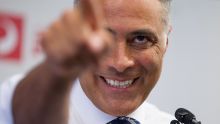When I was leader of the opposition, concerned about the standing of our politicians and failing confidence in our political processes, John Howard used to chip me about the need to recognise politics as a "profession", and politicians as "professionals".
Now, some 25 years on, the dissatisfaction with our career politicians and the political system is of paramount importance, and fundamental to the drift away from the major parties, whereby now almost one in three direct their votes elsewhere.
More BusinessDay Videos
What Turnbull thinks about Trump
Prime Minister Malcolm Turnbull discusses his relationship with President Donald Trump and weighs in on Australian and US ties.
Politics has become a daily "conflict game", dominated by career politicians concentrated on winning points on the other side, rather than on developing and delivering good public policy, and good government.
Important issues have been left to drift, or in some cases have been compounded by short-term, populist responses, so that important problems remain unresolved, all having a negative impact on the wellbeing of the average voter, let alone the legacies being left to their children.

Minor parties and independents are attracting support in protest, or in the now desperate hope that they will at least shake things up, perhaps even drive governments and oppositions to better economic and social outcomes. But they too are mostly opportunistic, and populist, and often "extreme", knowing they will never be in a position to have to deliver. Moreover, without experience and the requisite skills, they too may soon be "absorbed" or "defeated" by the system.
Unfortunately, the skill sets and experience required of a career politician essentially make them incompetent to govern effectively. Their career path is often from university, community or union politics, through local government/party engagement, perhaps serving as a ministerial staffer, to pre-selection, then election, and so on.
Politics has become the end in itself. Those that make it are mostly qualified just to play the "game", but not to govern.
Increasingly, fewer have ever had a "real job", or a significant career, before entering politics, and even then that may not qualify them to be a competent minister. It is also not easy to come from outside, as both Trump and Turnbull are finding.
Yet, many end up as ministers responsible for significant government portfolios, and large budgets, with little or no relevant experience or skills or commitment to that area, let alone in management.
Clearly, if we were to advertise the ministerial posts to attract those with the necessary competence – with the abilities, commitments, knowledge, experience and skills to do the job well – very few indeed, if any, of the current lot would be appointed.
While voters don't necessarily understand the intricacies of the political processes, they can recognise incompetence, and are forced to accept unsatisfactory outcomes. Their dissatisfaction and frustration is heightened by every example of abuse and excess by politicians with their perks and practices – snouts in the trough of their hard-earned tax dollars – while mostly ignoring the issues that challenge their daily lives.
Government incompetence has left many really struggling, living from hand to mouth, with insecurity about their job and health, and having to meet ever-rising costs of housing, childcare, medicines, insurance, power, phones/data and more, at a time of record household and student debt, inadequate transport, congestion, slow internet and other infrastructure failures and so on.
While in earlier decades the bureaucracy was more permanent, and motivated to give full and fearless advice, today it has been heavily politicised, by both appointments and processes. Many, too, have become enmeshed in the political game, seeking to ingratiate themselves with ministers, by telling them what they want to hear, or even by promoting only initiatives that they think they can get up. Many in the media, too, now also see themselves as players in the game, less likely to be as "investigative" as they should.
All up, the political system is now feeding on itself, promising even poorer government. While the likes of a Trump or a Hanson may certainly shake things up for a time, it is unlikely that they too have the core competencies to deliver and sustain better government. Similarly, the inevitable, European-style coalitions of traditional and minor parties are still likely to be dominated by career politicians.
Reform is possible, but necessarily multi-faceted and needs to be bipartisan, including a breakdown of the "discipline" of the major parties, reform of preselections and electoral voting arrangements, cleaning up campaign funding, lobbying, parliamentary processes, and ministerial remuneration and expenses, a federal ICAC, and so on.
Perhaps we could draw from the US system, current difficulties aside, where key cabinet posts, or policy tsars for key policy reform, could be appointed from outside on the basis of their expertise and competence.
The electorate wants politics to focus on competence, to deliver good public policy and better government, rather than on personalities and their careers, and cheap point scoring.
John Hewson is a professor at the Crawford School of Public Policy, ANU, and a former Liberal opposition leader.
















0 comments
New User? Sign up